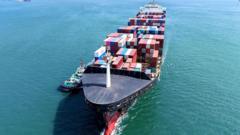The IMF has cut its US economic growth projection for this year from 2.7% to 1.8%, marking the most substantial downgrade among developed economies. This revision stems from increased trade uncertainty and escalating tariffs, which are anticipated to instigate a "significant slowdown" in global economic activity. The UK’s growth projection has also been lowered to 1.1%, though it is still positioned to outperform major European economies like Germany, France, and Italy. The IMF highlights inflation in the UK, currently at 3.1%, as the highest rate among advanced countries, driven by rising costs linked to energy and essentials.
**IMF Downgrades Global Growth Outlook Amid Trade Tariff Uncertainty**

**IMF Downgrades Global Growth Outlook Amid Trade Tariff Uncertainty**
The International Monetary Fund (IMF) has significantly revised down its global economic growth forecast due to trade tariff impacts.
The IMF’s chief economist, Pierre-Olivier Gourinchas, noted that the global economy is grappling with lasting effects from previous economic shocks and is facing renewed challenges. The surge in tariffs has escalated trade tensions, especially between the US and China, where tariffs on goods have reached as high as 145%. The potential repercussions of these tariffs on international trade could provoke uncertainty among businesses, skewing investment patterns and consumer behavior. As a result, the IMF expects global economic growth to decline from an earlier estimate of 3.3% to 2.8% for the current year, with a similar pattern predicted into 2026.
Moreover, the chances of a recession in the US have risen to 40% this year, compared to 25% previously estimated. Concurrently, China’s growth forecast was adjusted down to 4% from 4.6%, reflecting similar tariff-related pressures. The UK’s economic trajectory faces headwinds from both elevated government borrowing costs and diminishing consumer spending linked to escalating bills. Nonetheless, UK Chancellor Rachel Reeves remarked that the country remains the fastest growing within the European G7 and emphasized the importance of defending British interests amid global economic shifts.
The IMF’s World Economic Outlook also indicated that the eurozone's growth forecast has been reduced to 0.8%, with other nations like Canada and Mexico also seeing substantial forecast downgrades. The uncertainty inherent in tariff policy continues to make it difficult to predict economic trajectories accurately. Overall, the IMF’s report illustrates the profound impact of global trade dynamics on national economies amid ongoing geopolitical tensions.
Moreover, the chances of a recession in the US have risen to 40% this year, compared to 25% previously estimated. Concurrently, China’s growth forecast was adjusted down to 4% from 4.6%, reflecting similar tariff-related pressures. The UK’s economic trajectory faces headwinds from both elevated government borrowing costs and diminishing consumer spending linked to escalating bills. Nonetheless, UK Chancellor Rachel Reeves remarked that the country remains the fastest growing within the European G7 and emphasized the importance of defending British interests amid global economic shifts.
The IMF’s World Economic Outlook also indicated that the eurozone's growth forecast has been reduced to 0.8%, with other nations like Canada and Mexico also seeing substantial forecast downgrades. The uncertainty inherent in tariff policy continues to make it difficult to predict economic trajectories accurately. Overall, the IMF’s report illustrates the profound impact of global trade dynamics on national economies amid ongoing geopolitical tensions.






















